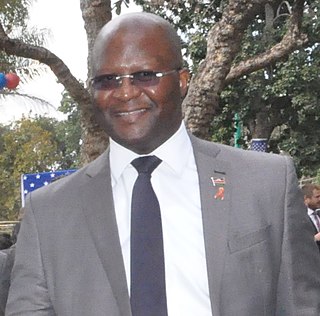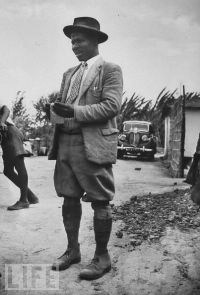Related Research Articles
The History of Malawi covers the area of present-day Malawi. The region was once part of the Maravi Empire. In colonial times, the territory was ruled by the British, under whose control it was known first as British Central Africa and later Nyasaland. It became part of the Federation of Rhodesia and Nyasaland. The country achieved full independence, as Malawi, in 1964. After independence, Malawi was ruled as a one-party state under Hastings Banda until 1994.

Politics of Malawi takes place in a framework of a presidential representative democratic republic, whereby the President of Malawi is both head of state and head of government, and of a multi-party system. Executive power is exercised by the government. Legislative power is vested in both the government and the National Assembly. There is a cabinet of Malawi that is appointed by the President of Malawi. The judiciary is independent of the executive and the legislature.

Hastings Kamuzu Banda was the prime minister and later president of Malawi from 1964 to 1994. In 1966, the country became a republic and he became the first president as a result.

Elson Bakili Muluzi is a Malawian politician who was the second freely elected president of Malawi from 1994 to 2004. He was also chairman of the United Democratic Front (UDF) until 2009. He succeeded Hastings Kamuzu Banda as Malawi's president. He also served in Banda's cabinet as minister without portfolio, before retiring in 1980.

Brown James Mpinganjira, popularly known as BJ is a Malawian Politician who used his 1986 detention to fight the injustices of the then one party state. He worked with others in prison and used their time to devise ways on how to change the direction of Malawi's political state.

The Malawi Congress Party (MCP) is a political party in Malawi. It was formed as a successor party to the banned Nyasaland African Congress when the country, then known as Nyasaland, was under British rule. The MCP, under Hastings Banda, presided over Malawian independence in 1964, and from 1966 to 1993 was the only legal party in the country. It has continued to be a major force in the country since losing power.

John Zenus Ungapake Tembo is a Malawian politician who served for years as President of the Malawi Congress Party (MCP). Tembo comes from the Dedza District in central Malawi, and he is a teacher by profession. Beginning in the 1960s he was an important politician in Malawi, and he was a key figure in the regime of Hastings Banda (1964–1994). He has been variously described as "physically slight, ascetic, fastidious" and "cunning". He was replaced as President of the MCP in August 2013.

Gwandaguluwe "Gwanda" Chakuamba Phiri was a Malawian politician who was the leader of the New Republican Party (NRP). He hailed from Nsanje, a district on the southern part of Malawi. Gwanda Chakuamba attended Zomba Catholic Secondary School, a 2 year metriculation at Sulosi College in Bulawayo Zimbabwe before proceeding to the US to study law though not much is known about whether he did a degree program or a short course.
Rodwell Thomas Changara Munyenyembe was a Malawian politician who served twice as Speaker of the National Assembly, from 1994 to 1999 and again from 2004 until his death. He also twice served as a cabinet minister, in the governments of Hastings Banda and Bakili Muluzi. He worked as a teacher prior to entering politics.
Chakufwa Chihana was a Malawian human rights activist, pro-democracy advocate, trade unionist and later, politician. He held the post of Second Vice President in Malawi, under President Bakili Muluzi. He is often called the 'father of Malawian democracy'. He served as leader of Malawi's first underground political movement, which urged President Hastings Kamuzu Banda, who had ruled for three decades, to call for a referendum on political pluralism. He was awarded the Robert F. Kennedy Human Rights Award in 1992.
Henry Masauko Blasius Chipembere was a Malawian nationalist politician who played a significant role in bringing independence from colonial rule to his native country, formerly known as Nyasaland. From an early age Chipembere was a strong believer in natural justice and, on his return in 1954 from university in South Africa, he joined his country's independence struggle as a nationalist strategist and spokesman. In 1957, considering that the independence movement need such a strong leader similar to Kwame Nkrumah, and considering himself too young for this task, he joined with other young nationalists in inviting Hastings Kamuzu Banda to return to Nyasaland as the movement's leader.

Atupele Muluzi is a Malawian politician, businessman and was a Member of Parliament for Machinga North East constituency from 2004 until May 27, 2019. He is also the President of the United Democratic Front and was a presidential candidate during the 2019 election. He was a running mate in the 2020 presidential elections, on a coalition ticket with incumbent President Peter Mutharika of the Democratic Progressive Party. Muluzi was Minister of Natural Resources, Energy and Mining from 2014 to 2015 and the only opposition member to serve in the Mutharika administration. Subsequently, he served as Minister of Home Affairs and Internal Security in 2015, and then Minister of Lands, Housing and Urban Development in 2015. He is currently Minister of Health. He is the son of the former president Bakili Muluzi.
Harry Thomson, also known as "Clean Harry", was a Malawian politician. He was born in Zomba, the capital of Nyasaland. He was a founding member of the United Democratic Front party (UDF) and a Minister of Trade and Industry.

James Frederick Sangala was a founding member of the Nyasaland African Congress during the period of British colonial rule. Sangala was given the nickname "Pyagusi", which means "one who perseveres".
Thamar Dillon Thomas Banda ("TDT") was a politician in Nyasaland in the years prior to independence. He was President-General of the Nyasaland African Congress (NAC) from 1957 to 1958, and founded the Congress Liberation Party in 1959.

Eta Elizabeth Banda is a former Malawian politician who was the country's Minister of Foreign Affairs from 2009 to 2011. Prior to entering politics, she worked as a health professional and university administrator.
Sam Mpasu was a Malawian politician, author, and former diplomat. He served as Minister of Commerce, Secretary General of the United Democratic Front (UDF) in 1999, and speaker of the Malawi National Assembly.

Catherine Gotani Hara is a Malawian politician who has been the Speaker of the National Assembly since June 2019, the first woman to hold the position.

Dick Matenje was a former Malawian politician and cabinet minister. He was the secretary-general of the Malawi Congress Party. He was one of the 'Mwanza Four' who mysteriously died during the Kamuzu Banda regime.

The cabinet crisis of 1964 in Malawi occurred in August and September 1964 shortly after independence when, after an unresolved confrontation between the Prime Minister, Hastings Banda and the cabinet ministers present on 26 August 1964, three ministers and a parliamentary secretary were dismissed on 7 September. These dismissals were followed by the resignations of three more cabinet ministers and another parliamentary secretary, in sympathy with those dismissed. Initially, this only left the President and one other minister in post, although one of those who had resigned rescinded his resignation within a few hours. The reasons that the ex-ministers put forward for the confrontation and subsequent resignations were the autocratic attitude of Banda, who failed to consult other ministers and kept power in his own hands, his insistence on maintaining diplomatic relations with South Africa and Portugal and a number of domestic austerity measures. It is unclear whether the former ministers intended to remove Banda entirely, to reduce his role to that of a non-executive figurehead or simply to force him to recognise collective cabinet responsibility. Banda seized the initiative, firstly, by dismissing some of the dissidents rather than negotiating, and secondly, by holding a debate on a motion of confidence on 8 and 9 September 1964. As the result of the debate was an overwhelming vote of confidence, Banda declined to reinstate any of the ministers or offer them any other posts, despite the urging of the Governor-General to compromise. After some unrest, and clashes between supporters of the ex-ministers and of Banda, most of the former left Malawi in October with their families and leading supporters, for Zambia or Tanzania. One ex-minister, Henry Chipembere went into hiding inside Malawi and, in February 1965 led a small, unsuccessful armed uprising. After its failure, he was able to arrange for his transfer to the USA. Another ex-minister, Yatuta Chisiza, organised an even smaller incursion from Mozambique in 1967, in which he was killed. Several of the former ministers died in exile or, in the case of Orton Chirwa in a Malawian jail, but some survived to return to Malawi after Banda was deposed and to return to public life.
References
- ↑ Ashaz, Josh (2008-05-07). "Speaker asked to resign". Nyasa Times. Archived from the original on 2008-06-28. Retrieved 2008-06-26.